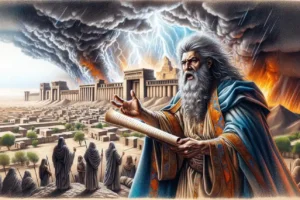
Zephaniah: Prophet who Warned of the Coming Day of the Lord
Zephaniah was a prophet in the Old Testament who ministered during the reign of King Josiah of Judah. His prophecies focused on the impending judgment known as the Day of the Lord, as well as the promise of restoration and blessings for the faithful remnant.
Quick Facts:
- Historical Context: Zephaniah prophesied during King Josiah’s reign (640-609 BC).
- Royal Lineage: Zephaniah was likely of royal descent, possibly a great-great-grandson of King Hezekiah.
- The Day of the Lord: Central theme of his prophecy, emphasizing imminent judgment.
- Judgment on Judah: Warned Judah of its impending doom due to idolatry and injustice.
- Judgment on Nations: Expanded his warnings to surrounding nations, including Philistia, Moab, Ammon, Cush, and Assyria.
- Call to Repentance: Urged the people to seek the Lord and righteousness.
- Promise of Restoration: Prophesied future blessings and restoration for the faithful remnant.
- Messianic Hope: Hinted at a future where God’s people would live in peace and prosperity.
- Literary Style: Known for its vivid imagery and poetic structure.
- Legacy: Zephaniah’s prophecies highlight the seriousness of divine judgment and the hope of redemption.
Historical Context
Zephaniah prophesied during the reign of King Josiah, a time of significant religious reform in Judah. Josiah became king at a young age and initiated efforts to return Judah to the worship of Yahweh, purging the land of idolatry. Zephaniah’s ministry likely began before these reforms took full effect, emphasizing the need for genuine repentance and spiritual renewal.
Royal Lineage
Zephaniah’s genealogy is detailed in Zephaniah 1:1, suggesting he was of royal descent, possibly related to King Hezekiah. This royal connection may have given him a unique perspective and authority in addressing the nation’s leaders and people.
The Day of the Lord
The central theme of Zephaniah’s prophecy is the Day of the Lord, a time of divine judgment and wrath against sin and disobedience. Zephaniah vividly describes this day as one of darkness, distress, and desolation (Zephaniah 1:14-18). This concept serves as a warning to the people of Judah and a call to recognize the seriousness of their spiritual state.
Judgment on Judah
Zephaniah specifically warned Judah of its impending judgment due to widespread idolatry, corruption, and social injustice. He condemned the syncretism and complacency that had infiltrated the religious life of the nation (Zephaniah 1:4-6). His prophecies served as a wake-up call to the people to turn back to God wholeheartedly.
Judgment on the Nations
Beyond Judah, Zephaniah also pronounced judgment on the surrounding nations, including Philistia, Moab, Ammon, Cush, and Assyria (Zephaniah 2:4-15). These nations, known for their hostility towards Israel, were also subject to God’s sovereign judgment, highlighting the universal scope of God’s justice.
Call to Repentance
Zephaniah urged the people to seek the Lord, righteousness, and humility in order to be hidden on the day of the Lord’s anger (Zephaniah 2:3). This call to repentance was an appeal for a return to faithful worship and ethical living, offering a chance for salvation amid impending doom.
Promise of Restoration
Despite the severe warnings, Zephaniah’s message also included a promise of restoration and hope. He prophesied that God would purify the lips of the peoples, enabling them to call on the name of the Lord and serve Him shoulder to shoulder (Zephaniah 3:9). This restoration would bring joy, peace, and prosperity to the faithful remnant (Zephaniah 3:14-20).
Messianic Hope
Zephaniah’s prophecies contain elements of messianic hope, envisioning a future where God’s people would live in peace and righteousness under divine protection. This future hope is characterized by God’s presence among His people, bringing comfort and security.
Literary Style
Zephaniah’s prophecies are noted for their vivid imagery and poetic structure. His use of metaphor and simile enhances the emotional and spiritual impact of his message, making the warnings of judgment and promises of restoration resonate deeply with his audience.
Legacy and Theological Significance
Zephaniah’s prophecies highlight the dual themes of judgment and redemption, underscoring the seriousness of sin and the necessity of repentance. His messages served to prepare Judah for the reforms of Josiah and to offer hope for a faithful remnant. Theologically, Zephaniah’s emphasis on the Day of the Lord and the ultimate restoration points to the broader biblical narrative of salvation history, culminating in the coming of Christ and the establishment of God’s kingdom.In conclusion, Zephaniah was a prophet whose warnings of the Day of the Lord and calls for repentance were critical in the spiritual renewal of Judah. His prophecies remain a poignant reminder of the importance of faithfulness to God and the hope of redemption.



